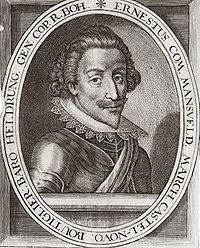- Ernst von Mansfeld
-
Ernst von Mansfeld 
Born c. 1580 Died November 29, 1626
Rakovica, Bosnia (region)Years of service ? - November 29, 1626 Battles/wars Thirty Years' War Ernst, Graf von Mansfeld (c. 1580 – 29 November 1626),[1][2] was a German military commander during the early years of the Thirty Years' War.
Contents
Biography
Mansfeld was an illegitimate son of Graf Peter Ernst von Mansfeld, and passed his early years in his father's palace at Luxembourg.
He gained his earliest military experiences in Hungary, where his half-brother Charles (1543–1595), also a soldier of renown, held a high command in the imperial army. Later he served under the Archduke Leopold, until that prince's ingratitude, real or fancied, drove him into the arms of the enemies of the house of Habsburg. Although remaining a Roman Catholic he allied himself with the Protestant princes, and during the earlier part of the Thirty Years' War he was one of their foremost champions.
He was despatched by Charles Emmanuel, duke of Savoy, at the head of about 2000 men to aid the revolting Bohemians when war broke out in 1618. He took Pilsen, but in the summer of 1619 he was defeated at the Battle of Sablat; after this he offered his services to the emperor Ferdinand II and remained inactive while the titular king of Bohemia, Frederick V, elector palatine of the Rhine, was driven in headlong rout from Prague. Mansfeld, however, was soon appointed by Frederick to command his army in Bohemia, and in 1621 he took up his position in the Upper Palatinate, successfully resisting the efforts made by Tilly to dislodge him.
From the Upper he passed into the Rhenish Palatinate. Here he relieved Frankenthal and took Hagenau; then, joined by his master, the elector Frederick, he defeated Tilly at Wiesloch (April 25, 1622) and plundered Alsace and Hesse. But Mansfeld's ravages were not confined to the lands of his enemies; they were ruinous to the districts he was commissioned to defend.
At length Frederick was obliged to dismiss Mansfeld's troops from his service. Then joining Christian of Brunswick the count led his army through Lorraine, devastating the country as he went, and in August 1622 was defeated by the Spaniards at Fleurus. He next entered the service of the United Provinces and took up his quarters in East Frisia, capturing fortresses and inflicting great hardships upon the inhabitants. A mercenary and a leader of mercenaries, Mansfeld often interrupted his campaigns by journeys made for the purpose of raising money, or in other words of selling his services to the highest bidder, and in these diplomatic matters he showed considerable skill.
About 1624 he paid three visits to London, where he was hailed as a hero by the populace, and at least one to Paris. James I, being the father-in-law of Frederick V, Elector Palatine, was anxious to furnish him with men and money for the recovery of the Palatinate, but it was not until January 1625 that Mansfeld and his army of "raw and poor rascals" sailed from Dover to the Netherlands. Later in the year, the Thirty Years' War having been renewed under the leadership of Christian IV of Denmark, he re-entered Germany to take part therein. But on April 25, 1626 Wallenstein inflicted a severe defeat upon him at the bridge of Dessau. Mansfeld, however, quickly raised another army, with which he intended to attack the hereditary lands of the house of Austria, and pursued by Wallenstein he pressed forward towards Hungary, where he hoped to accomplish his purpose by the aid of Bethlem Gabor, prince of Transylvania. But when Gabor changed his policy and made peace with the emperor, Mansfeld was compelled to disband his troops. He set out for Venice, but when he reached Rakowitza near Sarajevo, in Bosnia, he was taken ill, and here he died on the November 29, 1626. He was buried at Split.
Notes
References
 This article incorporates text from a publication now in the public domain: Chisholm, Hugh, ed (1911). Encyclopædia Britannica (11th ed.). Cambridge University Press. It cites:
This article incorporates text from a publication now in the public domain: Chisholm, Hugh, ed (1911). Encyclopædia Britannica (11th ed.). Cambridge University Press. It cites:
- F. Stieve, Ernst von Mansfeld (Munich, 1890)
- R. Reuss, Graf Ernst von Mansfeld im böhmischen Kriege (Brunswick, 1865)
- A. C. de Villermont, Ernest de Mansfeldt (Brussels, 1866)
- L. Graf Uetterodt zu Scharfenberg, Ernst Graf zu Mansfeld (Gotha; 1867)
- J. Grossmann, Des Grafen Ernst von Mansfeld letzte Pläne und Thaten (Breslau, 1870)
- E. Fischer, Des Mansfelders Tod (Berlin, 1878)
- S. R. Gardiner, History of England, vols. iv. and v. (1901);
- J. L. Motley, Life and Death of John of Barneveld (ed. 1904; vol. ii)
Further reading
- Prosopography of the Mansfeld family
- Ernst von Mansfeld at Genealogics
- Ernst von Mansfeld - notification (also in English) concerning the latest biography about the mercenary leader (published in September 2010)
Categories:- 1580s births
- 1626 deaths
- House of Mansfeld
- Mercenaries
- German nobility
- German people of the Thirty Years' War
Wikimedia Foundation. 2010.
